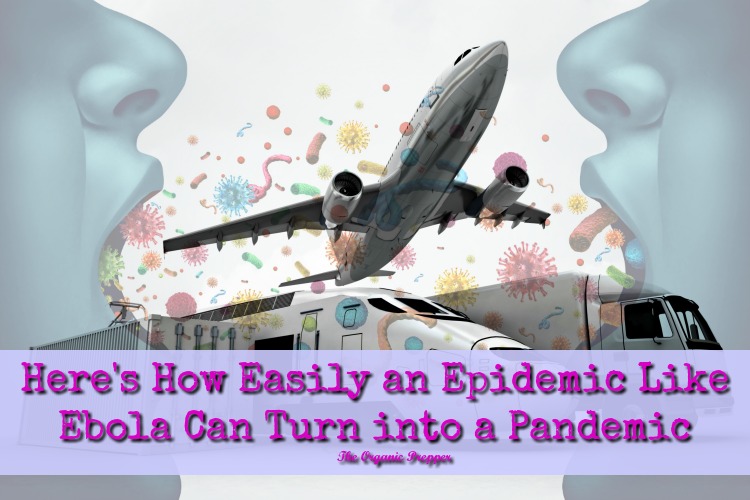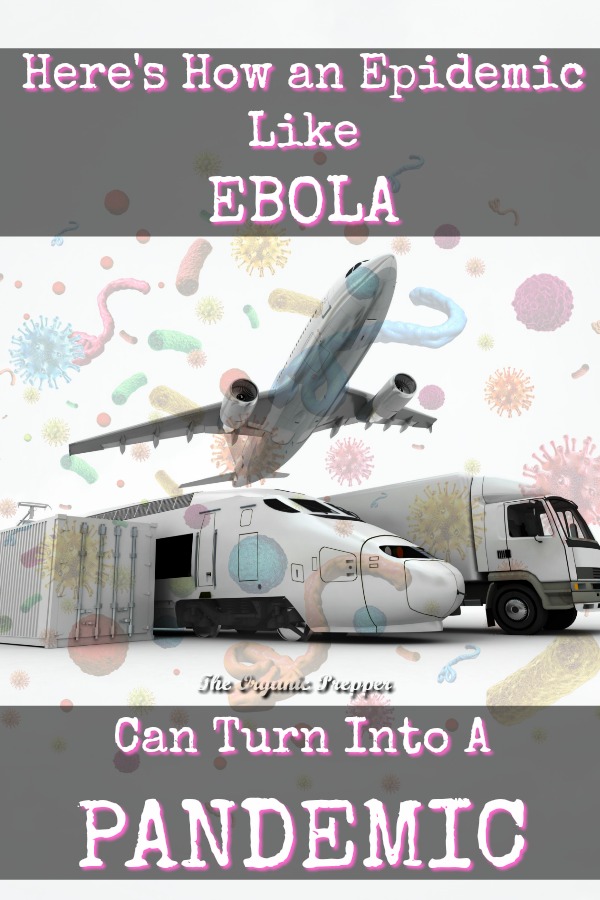If you're new here, you may want to subscribe to my RSS feed. Thanks for visiting!
By Daisy Luther
Remember the soothing words of the World Health Organization about the Ebola outbreak in the Congo?
Don’t worry, they said. It’s in a remote village that doesn’t even have real roads, they said.
Except, the problem is, now people are fleeing from that village in fear of the virus.
KINSHASA, Democratic Republic of Congo – Ebola drove Kevin Balenge, his wife and three children to get to this capital city as fast as they could to try to outrun a suspected new outbreak.
“We can’t stay here because there are no hospitals, and once you get the virus you simply die,” said Balenge, from Bas-Uele province in the north of the country, about 51 hours away from Kinshasa.
“Residents are still not aware of the virus and they do not know the precautions (to take),” he added. “Very many people are going to die here.”
…
“Staying here is like trying to play with death,” he said. “Ebola gives no second chance and I can’t risk it. If I can save myself, I will try to do so.”(source)
Now, we don’t know if this family of five has been infected or not, but the spread through Lakiti has increased exponentially. Let’s think about this.
How to Get Prepped for Ebola 2.0
They traveled for 51 hours.
They clearly made stops along the way in public places like gas stations, restaurants, using restrooms, maybe motels. They would have paid for the products and services, giving money to people who would, in turn, be in physical contact with other travelers.
Now the family is in the capital, where the population is 10.12 million people.
And that isn’t even the worst of it.
In Kinshasa, there are many opportunities for even further transit, and fairly easily.
It’s where N’Djili International Airport is served by Kenya Airways, Air Zimbabwe, South African Airways, Ethiopian Airlines, Brussels Airlines, Air France and Turkish Airlines, to name just a few. Where a person can fly to anywhere else in the world. Where a person could hop on a train or a boat at one of the countries largest ports and leave the country.
Because of the ease of transit, this original family wouldn’t need to be the ones leaving the country. They could stay right where they are and infect a person who is there visiting and who will soon get on a plane or a train or a boat and take the virus with them.
You see where I’m going with this. It’s like watching the movie Contagion, except this is real. This is how easily a localized epidemic can turn into a global pandemic. (Which is, of course, redundant, since pandemic means it has spread across the world.)
The World Health Organization is currently trying to track down 125 people whom they believe may have contracted the virus. In the past few weeks, three people have died and 20 have been confirmed to be sick with Ebola as the illness gains a foothold. This is only an estimate, as officials are not yet on the scene because of the difficulty of transportation and telecommunications.
But could the 125 people be difficult to find because they already left the area?
Relatives of families who work and stay in the capital, Kinshasa, have been making arrangements for their families in the north to join them to avoid contracting the virus.
Dressed in a black coat over his tracksuit, Roland Bashala, 38, called his wife who has been staying in the north near the border.
“I need her to come tomorrow with our children so that I don’t lose them all,” he said. “Ebola is very dangerous and it can spread throughout the region.” (source)
There are no precautions in highly populated areas
Nearly 3000 refugees have recently landed in the highly populated Northern Congo area due to violence in the Central African Republic, any of whom could have been exposed or could possibly be ill. Ebola has an incubation period of 2 to 21 days. (source)
And there are no precautions in place.
“Ebola could spread throughout the country if the government doesn’t take precautions by screening anyone who enters the city,” said Devina Katobu, a doctor in Kinshasa. “Already people are living in fear, and are still moving from one place to another to seek safe haven. I think they might be spreading the virus. The international community should move quickly to save this country from the epidemic.” (source)
With anything this deadly, whether it is Ebola, or as a reader commented, SARS, H1N1, MERS, or an Avian flu, the ease of travel and slow responses mean that these things can turn into pandemics. Adding panic to the mix is like throwing gasoline on a fire. They could even evolve into something along the lines of the Spanish Influenza in 1918, which killed an estimated 100 million people – and this happened well before we all began jet-setting all over the place just for fun.
What you need to be doing
While it’s not time to panic, it’s time to prepare.
If you aren’t prepared to go into lockdown with your family, you need to do some prepping. If you wait until it actually hits American shores, you’ll be competing for resources. The last time that Ebola threatened the United States, I had to dig through the internet for suppliers who still had things like Tyvek suit and nitrile gloves, and as I dug deeper, the prices went up. Go here to learn how to prep for Ebola and find a downloadable list of pandemic preparedness supplies. Then, take action. You may only need to fill in a few gaps. None of these things would be a waste of money – there are other situations in which they could be useful.
And, as the saying goes, better to have them and not need them, than need them and not have them.


















11 Responses
What about people who have typical jobs? If you don’t go to work for 4-6 weeks, you’ll get fired. Would many businesses close in the case of an actual pandemic?
I would assume if things got really bad, most businesses would close. And you’re right – you probably would lose your job. This isn’t a decision to undertake lightly. You’d want to be certain that your reasoning was sound and not coming from a place of panic.
I continue to seek to understand the evolving situation and to be prepared, but I must admit that I’m hoping that this will just blow over like all previous viral outbreaks of the 21st century.
Me too! Hopefully they can get an immediate handle on it.
This is what happened in a large hospital in NYC when ONE Ebola patient arrived.
If Ebola patients started arriving in many U.S. hospitals, I believe MANY people would stay home, not just hospital workers, but other occupations too.
Staffers at Bellevue Hospital (in NYC) called in sick en masse on Friday as Ebola fears ran rampant – 10/25/14
“An extraordinary number of Bellevue Hospital staffers called in sick on Friday rather than treat the city’s first Ebola patient — and those who showed up were terrified to enter his isolation chamber, sources told The Post.”
“The nurses on the floor are miserable with a ‘why me?’ attitude, scared to death and overworked because all their co-workers called out sick,” one source said.
http://nypost.com/2014/10/25/many-bellevue-staffers-take-sick-day-in-ebola-panic/
One thing you didn’t mention about Ebola is that it is not contagious until the person becomes symptomatic. So people who have had contact with a person who later starts showing symptoms is really not exposed to the virus. The reason no one who flew with the man from Africa who died in Dallas did not come down with the virus was that he did not have any symptoms when he was on the airplane, so he was not contagious. And you have to come in contact with body fluids in order to contract this disease. Yes, blood or other body fluids. While CDC tried to claim that the virus is not airborne, they knew from previous studies that it can be carried in the small amounts of spit given off in a sneeze or cough. But baring that, very little chance of contracting the disease with no human contact with the body fluids of a person showing the symptoms. And once a person starts showing symptoms the disease progresses so rapidly that it soon becomes obvious that the person might have Ebola. That is why people who fly from Africa are screened by the people at the airports and the flight attendants are carefully trained, especially on international flights to observe the passengers for symptoms of Ebola and other potential pandemic diseases. That was why and how a flight was diverted a couple years ago and all passengers held on the plane when a passenger was noticed with symptoms of what could have been Ebola until that passenger could be evaluated. Turned out to be a false alarm, but the flight attendants are constantly trained and retrained to observe the passengers for just that reason. I have a friend who is a purser for Delta and she has told me about all the training they get.
BTW – during the Obama admin laws were passed and the CDC now has regional centers where, in a crisis situation, Americans can be sent against their will, if they display symptoms of any of these potential pandemic diseases. They will be held there, again, against their will. If they don’t have the actual disease when sent there, they will likely develop that disease while there and quite likely die. They will be death traps for anyone sent there. I believe there are three of those regional centers in Texas, alone. Most of those centers are in areas where there are hubs of traffic from other nations. In Texas I believe they are in Dallas, Houston and maybe El Paso, not sure on the last one.
It was truly grace of God that no one got sick when that nurse flew back to Dallas with Ebola who was already showing symptoms when she flew. And the craziest part of that was she had notified CDC before she flew home and told them she had a fever and other symptoms of Ebola and they still told her it was safe to fly home. I don’t know if the woman was even given a mask to wear on the flight. That had not been reckless behavior on her part, but was unbelievably reckless and foolish on the part of the personnel at CDC who gave her the clearance to fly home knowing she had been exposed and was showing symptoms. I don’t know if the airline involved had been notified or warned about her possibly having active, contagious Ebola while on the flight. Apparently not, since they flew several other flights with the same plane before they had taken it out of commission for cleaning after becoming aware she had traveled on it with active, contagious Ebola. It is sloppy medical practices like that that could cause more problems than anything else.
This is fantastic information, Gena. Do you work in the medical field?
Reading this article just made the headache I’ve had for the last three days worse. Now if I could just get rid of this low grade fever….
Ahhh…! Daisy, you just keep raising the bar, per excellence in truthful analysis. –much admiration here– 🙂
Stop the globalism. Stop bringing in 3rd world squalor into the West. Keep Ebola in Africa. Don’t let these people travel to Western countries. Problem solved. BTW, we’re not obligated to have our flood gates open. As a sovereign nation, the country can decide to close its borders. Screw political correctness.